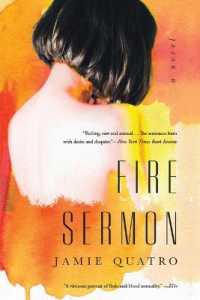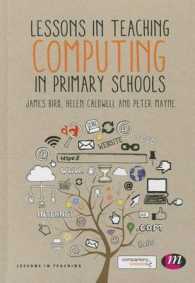- ホーム
- > 洋書
- > 英文書
- > Literary Criticism
Full Description
New ideas for teaching contemporary social justice through Shakespeare and Renaissance literature
Describes innovative and portable teaching methods informed by recent scholarship in early modern literature, cultural studies, and critical pedagogyOffers strategies for effective teaching and advocacy amidst the growing cultural and economic complexities of higher educationDemonstrates the relevance of historical literary study to contemporary cultural conversations, especially those about social justiceHistoricizes the malicious "whitening" of Shakespeare and European culture, recognizing instead multiple, multicultural, accessible ShakespearesPresents Shakespeare's plays as a common corpus of great value to democratic conversations in widely divergent contexts Gives educators language for promoting the virtue of humanistic inquiry and when higher education is on the defensiveThis book is for teachers who want to heighten the intellectual impact of their courses by using their classrooms as a creative space for social formation and action. Its twenty-one chapters provide diverse perspectives on Shakespeare and early modern literature that engage innovation, collaboration, and forward-looking practices. They model ways of mobilizing justice with early modern texts and claim the intellectual benefits of integrating social justice into courses. The book reconceives the relationship between students and Renaissance literature in ways that enable them - and us - to move from classroom discussions to real-life applications.
Contents
AcknowledgmentsNotes on the contributors Introduction: Making Meaning and Doing Justice with Early Modern Texts, Wendy Beth Hyman and Hillary Eklund
Part I: Defamiliarizing Shakespeare
1. Topical Shakespeare and the Urgency of Ambiguity, Adhaar Noor Desai2. Shakespeare in Transition, Sawyer Kemp3. Shakespeare in Japan: Disability and a Pedagogy of Disorientation, Allison P. Hobgood 4. Global Performance and Local Reception: Teaching Hamlet and More in Singapore, Emily Griffiths Jones
Part II: Decolonizing Shakespeare
5. African-American Shakespeares: Loving Blackness as Political Resistance, Jason M. Demeter6. Chicano Shakespeare: the Bard, the Border, and the Peripheries of Performance, Ruben Espinosa7. "Intelligently organized resistance": Shakespeare in the Diasporic Politics of John E. Bruce, Kim F. Hall
Part III: Ethical Queries and Practices8. Sexual Violence, Trigger Warnings, and the Early Modern Classroom, Kirsten Mendoza9. Rural Shakespeare and the Tragedy of Education, Jeffrey Osborne10. Shakespearean Tragedy, Ethics, and Social Justice, Mary Janell Metzger11. Teaching Environmental Justice and Early Modern Texts: Collaboration and Connected Classrooms, Rebecca Laroche and Jennifer Munroe12. Failing with Shakespeare: Political Pedagogy in Trump's Autumn, Steve Mentz
Part IV: Revitalizing the Archive and Remixing Traditional Approaches
13. Teaching Serial with Shakespeare: Using Rhetoric to Resist, Rachel E. Holmes14. Adjunct Pleasure: Shakespeare's Sonnets and the Writing on the Walls, Matthew Harrison15. Confronting Bias and Identifying Facts: Teaching Resistance Through Shakespeare, Carla Della Gatta16. Literary Justice: The Participatory Ethics of Early Modern Possible Worlds, Debapriya Sarkar
Part V: Shakespeare, Service, and Community
17. Shakespeare, Service Learning, and the Embattled Humanities, Hillary Eklund18. Teaching Shakespeare Inside-Out: Creating a Dialogue Between Traditional and Incarcerated Students, Jayme M. Yeo19. "'Shakespeare' on his lips": Dreaming of The Shakespeare Center for Radical Thought and Transformative Action, Eric L. De Barros20. From Pansophia to Public Humanities: Connecting Past and Present Through Community-Based Learning, Tania Boster21. Cultivating Critical Content Knowledge: Early Modern Literature, Pre-Service Teachers, and New Methodologies for Social Justice, Todd Butler and Ashley Boyd
Afterword, Ayanna ThompsonBibliographyIndex

![フェリシモの手づくり クチュリエ 〈2025-2026年秋冬号〉 [カタログ]](../images/goods/ar2/web/imgdata2/48943/4894328364.jpg)






